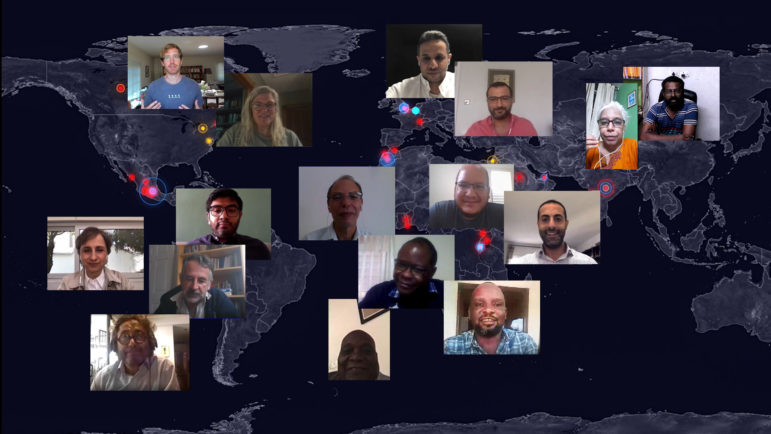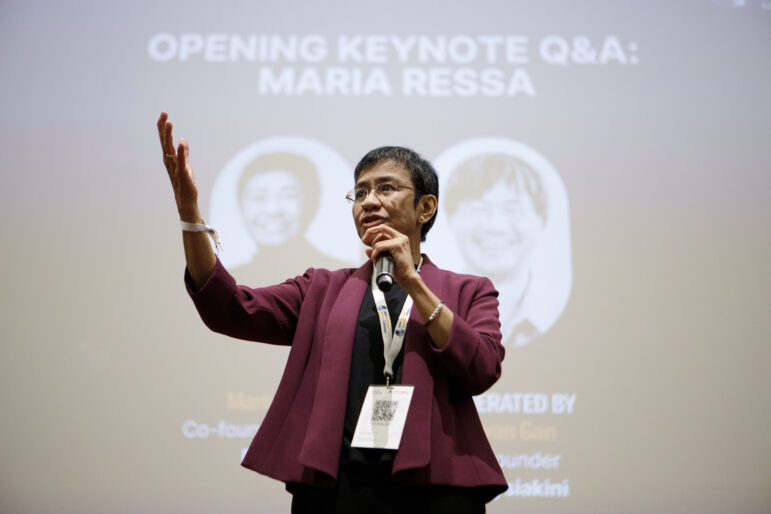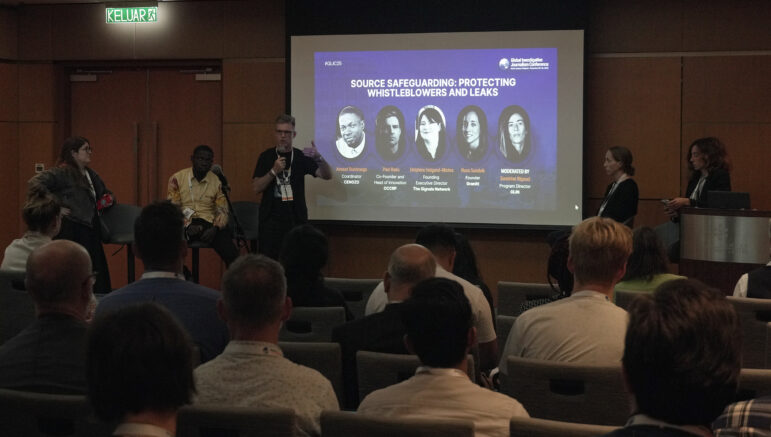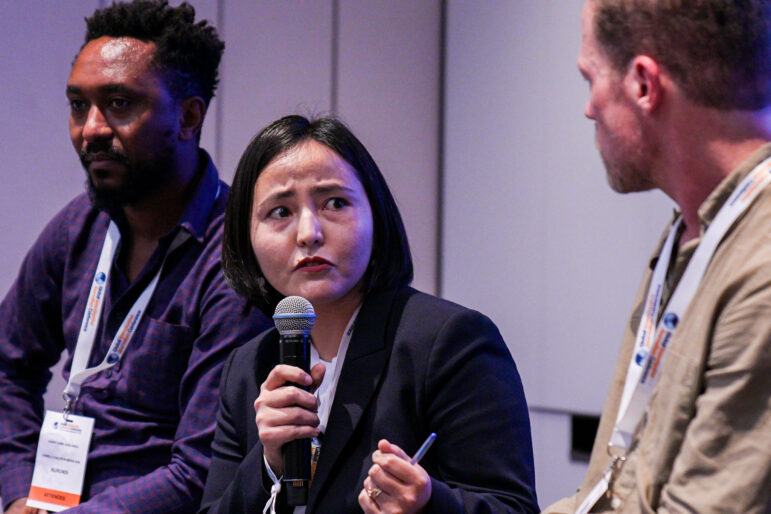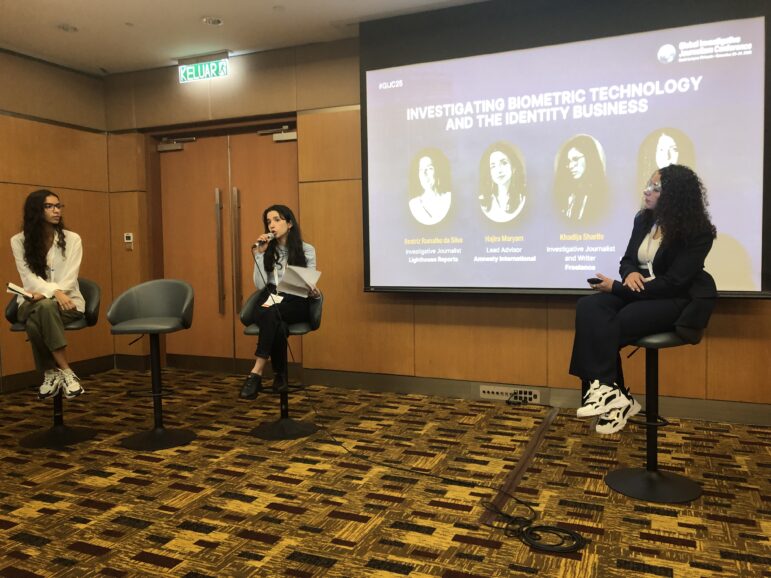

Beatriz Ramalho da Silva of Lighthouse Reports; Hajira Maryam, advisor at Amnesty International’s Algorithmic Accountability Lab, and Hala Nouhad Nasreddine, head of the investigative unit at Daraj Media (left to right) speaking at GIJC25. Image: Rowan Philp for GIJN
In Pakistan, you can’t buy a phone SIM card without a digital ID. Meanwhile, in sub-Saharan Africa, citizens have experienced sudden and sweeping switches to digital systems. Around the world — in the Global South in particular — people are increasingly compelled to use, or submit information to, identification technologies.
Governments purchase or license these technologies from a rapidly growing biometric tech industry. Beyond the use of taxpayers’ money, this industry also exacts societal and immensely personal costs.
The industry and its government supporters claim that its products — from facial recognition and biometric voter registration systems, to iris scanners and digital ID cards — can reduce corruption. Yet investigative reporters frequently uncover major data harvesting threats, biases against minorities, privacy breaches, inflated pricing, and outright corruption in public contracts related to this emerging tech.
In a timely session on “Investigating Biometric Technology and the Identity Business” at the 14th Global Investigative Journalism Conference (GIJC25) in Malaysia, a panel of three investigative reporters on the frontlines of this beat shared practical tips for digging into this phenomenon and overcoming the sector’s technical jargon.
The panel included Beatriz Ramalho da Silva, a journalist at Lighthouse Reports; Hajira Maryam, lead advisor on artificial intelligence and strategic communications at Amnesty International’s Algorithmic Accountability Lab; and Hala Nouhad Nasreddine, head of the investigative unit at Daraj Media.
“This is such an interesting investigative area because it is at the intersection of tech, human rights, and ‘follow the money,’ and is connected to so many abuses,” said Nasreddine. “We should all be more involved.”
The panel described a series of recent investigative findings in Africa, including vastly inflated vendor contracts and the use of biometric systems to target critics.
In 2024 in Mozambique, da Silva found that a newly implemented, sophisticated — but skewed and expensive — voter registration system had “become a means for the ruling party to maintain control.”
“We discovered that the system was repeatedly being used for fraud in elections,” she explained. “The technology was used to inflate the number of pro-ruling-party voters and also suppress opposing voters from registering.” She said the effects of the system correlated to much higher levels of election violence.
In the same year, Bloomberg found that a new national ID card system from a major Chinese vendor had become the foundation for a “sweeping surveillance state” in Uganda.
Another Bloomberg report into the industry revealed that public money — intended for the creation of ID cards in the Democratic Republic of the Congo (DRC) — was channeled through shell companies for the benefit of a few elites and to build a shopping center. Despite billions of dollars spent on biometric contracts, the DRC has had no national ID system in place since the 1990s. “The crackdown on critics has accelerated since Uganda rolled out its ID biometric system,” said da Silva.
Tips from speakers for investigating this industry included:
-
- Keep on top of the latest developments. Websites, such as the news and market research portal Biometric Update, can give you “a feel for the industry”, said Daraj’s Nasreddine: “You’ll also get short news wire articles saying X company has sold X contract to Y.”
- Find ex-employees on LinkedIn. Building sources is critical. “These contracts and tenders are quite opaque — and there’s often no paper trail in many countries,” explained Nasreddine. “Get on LinkedIn and message people who worked for these companies or government departments.” Tools, such as Lusha and Rocket Reach, that have browser plug-ins, can show you the emails and numbers of people found on LinkedIn, she added.
- Find leads on contracts through export trade databases such as Sayari and 52WMB. “It’s always a mix of methods, but definitely try these databases,” said Amnesty International’s Maryam. “Through 52WMD, we found companies supplying problematic systems.”
- Attend vendor fairs, such as ID4Africa. Panelists said trade fairs were rich sources of willing contacts, middlemen, contract leads, and useful, sector-specific trade talk.
- Check for government tenders websites and court records, and search for former procurement officials.
- If no one is talking, approach industry associations and NGOs. Many of the affected countries don’t have freedom of information laws, but there are industry associations and NGOs you can approach who might know about relevant contracts, said the panel. “There was no open source information on projects like Mozambique, so it goes back to source-building,” said Nasredinne. “That’s hard because people are stressed or scared. What works in contexts without paper trails is talking to people in different parts of the supply chain.”
“Always ask yourself: who is this technology really empowering or benefiting?” said Maryam.
“A lot of people might say this kind of tech is not inherently bad; it’s about how it’s being used,” explained da Silva. “[B]ut what we’re talking about here is how these companies sell tech that ends up being useless in these [Global South] contexts, because either it fails on the ground — because it’s not appropriate for that environment — or it’s ruined by corruption.”
 Rowan Philp is GIJN’s global reporter and impact editor. A former chief reporter for South Africa’s Sunday Times, he has reported on news, politics, corruption, and conflict from more than two dozen countries around the world, and has also served as an assignments editor for newsrooms in the UK, US, and Africa.
Rowan Philp is GIJN’s global reporter and impact editor. A former chief reporter for South Africa’s Sunday Times, he has reported on news, politics, corruption, and conflict from more than two dozen countries around the world, and has also served as an assignments editor for newsrooms in the UK, US, and Africa.

